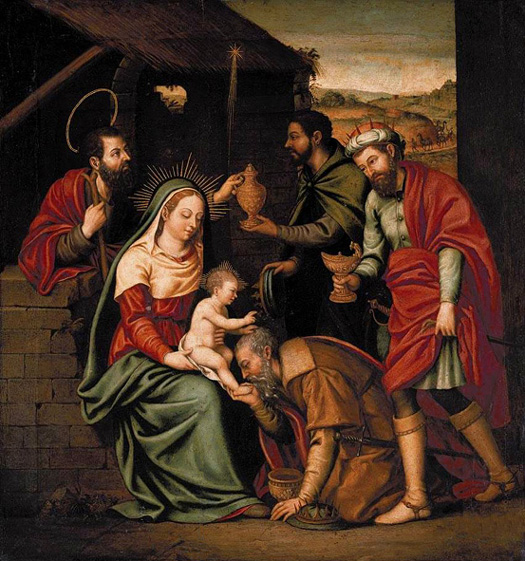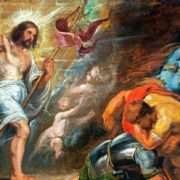 Q. Today we celebrate the Epiphany of the Lord. Can you explain the meaning of this feast?
Q. Today we celebrate the Epiphany of the Lord. Can you explain the meaning of this feast?
A. The word Epiphany means “manifestation (of God)”. In Matthew’s Gospel, there is a great concern to reveal, or “manifest” Jesus as the divine yet human “Son of David”, the true heir to David’s throne (Matthew 1:1). It’s interesting to note that the term “Kingdom of God”, so crucial in Jesus’ teaching, does actually have Old Testament roots. However, the key to understanding the phrase is this: the only time it was ever used there was in reference to David’s Kingdom.
This is intentional on Jesus’ part; in fact, as he assembles his New Covenant Kingdom, Jesus incorporates many of the features of the Old Covenant Kingdom of God, David’s Kingdom. For example, Peter as Pope holds the equivalent of the OT office of “Prime Minister” (see Isaiah 22), one of a cabinet of twelve apostles, representing the twelve tribes of Israel in David’s Kingdom.
Who was the original “Son of David”? Solomon. Solomon, like Jesus, was known as an exorcist, although Jesus’ powers are orders of magnitude greater in this regard. Solomon also was known for his exceptional wisdom, and once again Jesus bests him in this arena, too (think of, for example, Jesus’ brilliant answer to the question about paying taxes to Caesar).
Q. Who was the Queen in Solomon’s Kingdom, and is there a corresponding office in Jesus’ Kingdom?
A. Solomon, of course, had many wives and concubines, which was utterly displeasing to God. However, this was a common practice for kings in antiquity, as marrying foreign wives was a way to consolidate power by means of political alliances. But these wives ultimately turned Solomon’s heart away from the Lord, contributing to his downfall.
This gave rise to a very practical question: with so many wives, who would be the queen? It’s not as if there would be a mud-wrestling match of sorts between them all to determine which woman would gain the throne next to that of the king. The answer to the dilemma was very simple: the queen would be the queen mother, known in Solomon’s Kingdom as the Gebirah. In Solomon’s case, the Queen Mother was Bathsheba, and the Old Testament shows how people would approach her in order to receive an appointment with, or gain favours from, the king.
The New Covenant example is obvious: Matthew takes great pains to show how Mary is the Queen Mother of the Kingdom of the new Son of David, Jesus. In Chapter 2:1-12, international figures pay royal tribute to the new king, seated with his mother. Solomon and Bathsheba are “types” prefiguring Jesus and Mary.
Psalm 72 (of Solomon, no less), is about kings from distant lands who pay tribute to the Davidic King:
1 (A Psalm of Solomon.) Give the king thy justice, O God, and thy righteousness to the royal son! 2 May he judge thy people with righteousness, and thy poor with justice! 3 Let the mountains bear prosperity for the people, and the hills, in righteousness! 4 May he defend the cause of the poor of the people, give deliverance to the needy, and crush the oppressor! 5 May he live while the sun endures, and as long as the moon, throughout all generations! 6 May he be like rain that falls on the mown grass, like showers that water the earth! 7 In his days may righteousness flourish, and peace abound, till the moon be no more! 8 May he have dominion from sea to sea, and from the River to the ends of the earth! 9 May his foes bow down before him, and his enemies lick the dust! 10 May the kings of Tarshish and of the isles render him tribute, may the kings of Sheba and Seba bring gifts! 11 May all kings fall down before him, all nations serve him! 12 For he delivers the needy when he calls, the poor and him who has no helper. 13 He has pity on the weak and the needy, and saves the lives of the needy. 14 From oppression and violence he redeems their life; and precious is their blood in his sight. 15 Long may he live, may gold of Sheba be given to him! May prayer be made for him continually, and blessings invoked for him all the day! 16 May there be abundance of grain in the land; on the tops of the mountains may it wave; may its fruit be like Lebanon; and may men blossom forth from the cities like the grass of the field! 17 May his name endure for ever, his fame continue as long as the sun! May men bless themselves by him, all nations call him blessed! 18 Blessed be the LORD, the God of Israel, who alone does wondrous things. 19 Blessed be his glorious name for ever; may his glory fill the whole earth! Amen and Amen! 20 The prayers of David, the son of Jesse, are ended.
Of special note are these verses: “May the kings of Tarshish and of the isles render him tribute, may the kings of Sheba and Seba bring gifts! May all kings fall down before him, all nations serve him!” (vv. 10-11), and “Long may he live, may gold of Sheba be given to him!” (v. 15a). This episode from Solomon’s reign, is, in a sense, being recapitulated in Jesus’ life. The message is clear: Jesus is the King; he can be found close to his Mother, our Queen, who gains access for us to the royal “Throne Room”, where we pay Jesus the tribute of our lives, make our requests known to him, and receive his favor.


